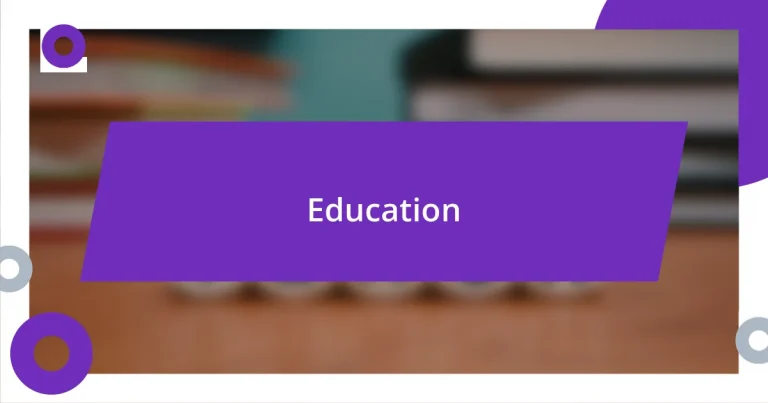Key takeaways:
- Understanding personal motivation involves aligning learning with personal values, setting achievable milestones, and connecting interests to create an enjoyable journey.
- Effective goal-setting is crucial; specificity, measurability, and flexibility help create a clearer path, enhance accountability, and sustain motivation.
- Tracking progress, seeking external accountability, and reflecting on challenges and successes are essential practices that reinforce motivation and celebrate learning achievements.
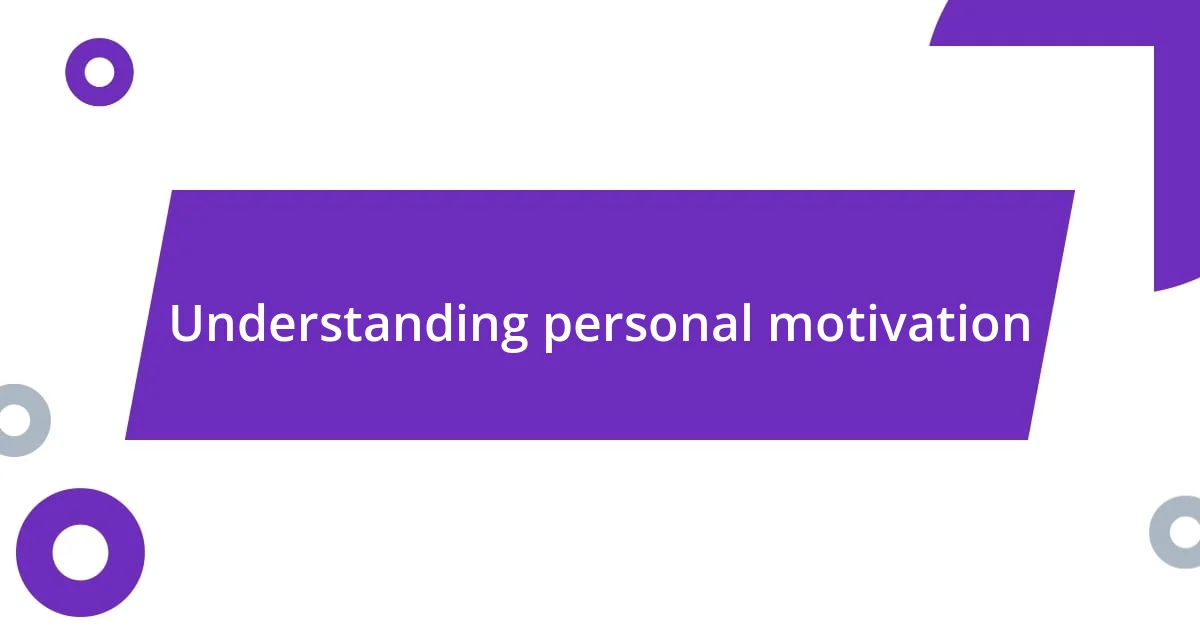
Understanding personal motivation
Understanding what drives us is crucial to harnessing our motivation. I remember a time when I was attempting to learn a new language. Initially, I was driven by the desire to converse during my travels, but as I immersed myself in the culture through music and films, my motivation shifted—suddenly, learning became a joy, not just a goal.
Every individual has unique triggers that spark their enthusiasm. For instance, I’ve found that setting small, achievable milestones creates a sense of accomplishment that keeps me going. Have you noticed how rewarding it feels to check something off your list? That little dopamine hit can be the difference between enthusiasm and burnout.
Moreover, I’ve learned that aligning my studies with my values enhances my commitment. When I pursued a project linked to a passion of mine, I could hardly contain my excitement. Why do our interests matter so much? Because when we connect what we learn to what we truly care about, motivation evolves from a chore into a compelling journey.
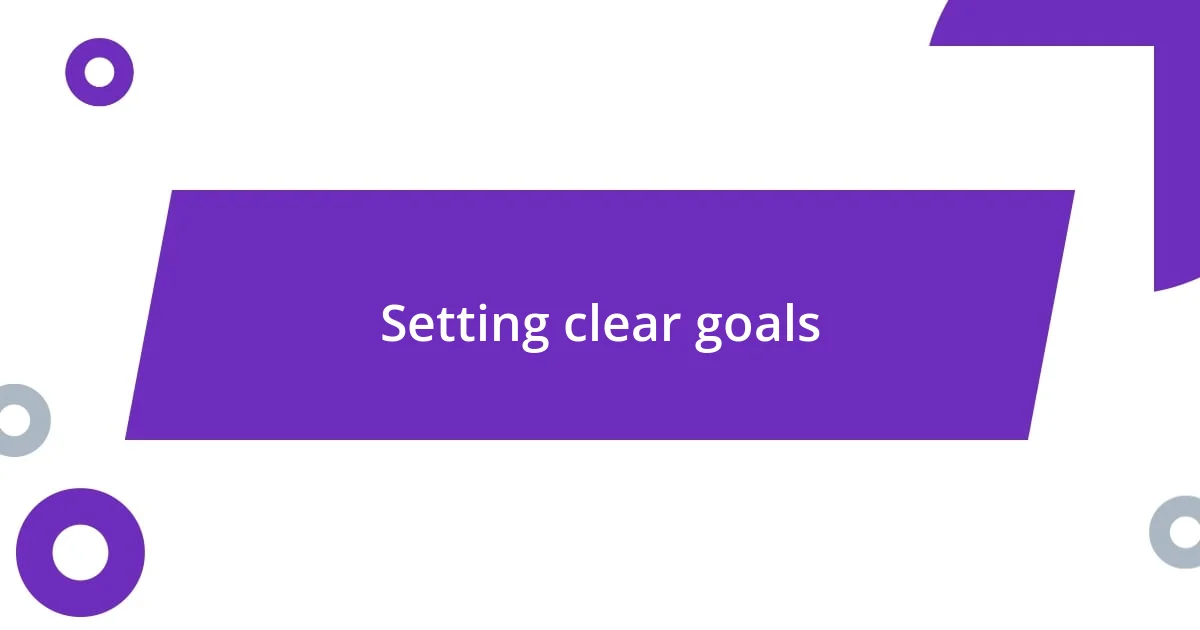
Setting clear goals
Setting clear goals is synonymous with having a roadmap for your learning journey. I vividly recall when I decided to enhance my coding skills. Initially, I set a large, vague goal: “Become a better programmer.” However, it wasn’t until I broke that down into specific objectives, like completing an online course and building a personal project, that my motivation really took off. Each completed task felt like a building block in my growth, making the path much clearer and more rewarding.
When I think about effective goal setting, specificity is key. For example, instead of saying I wanted to read more books, I committed to reading one book per month on a specific topic. This not only gave me a clear target, but it also helped me track my progress. Have you ever noticed how measurable goals create a tangible sense of achievement? I’ve found that writing down my goals in a journal adds to the accountability and makes reaching them even more satisfying.
Lastly, it’s important to regularly revisit and adjust your goals. Life changes, and so do our interests. I remember a time when I was focused on improving my public speaking skills; halfway through, I realized I was more passionate about storytelling than presentations. By shifting my goal to craft compelling narratives, my motivation sparked anew. Are your goals still aligned with your passions? Reflecting on this can reinvigorate your learning process.
| Characteristics of Goals | Impact on Motivation |
|---|---|
| Specificity | Increases clarity, making tasks less overwhelming |
| Measurability | Provides a sense of achievement, motivating further progress |
| Flexibility | Allows alignment with evolving interests, sustaining enthusiasm |
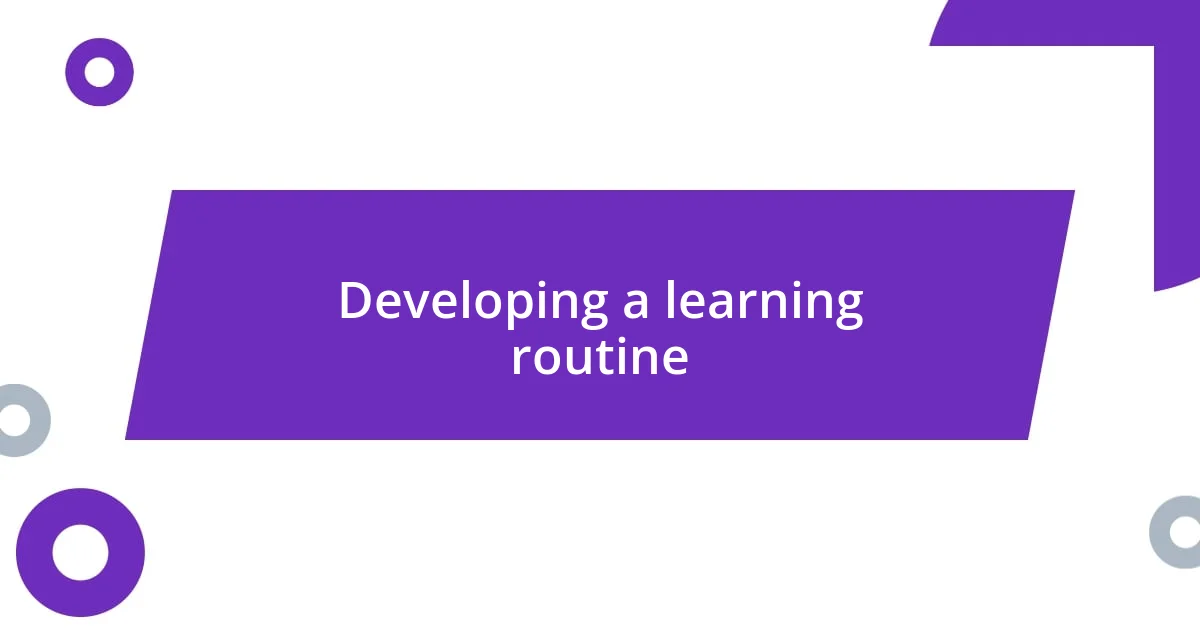
Developing a learning routine
Establishing a learning routine can be a game-changer. Personally, I’ve found that consistency is what helps cement my learning habits. At one point, I decided to dedicate an hour each morning to study a new skill—this simple commitment transformed my productivity. I could see the cumulative benefits of this routine; the knowledge I absorbed felt like it was building each day, and I began to look forward to those quiet mornings where learning became a cherished habit rather than a chore.
To create an effective learning routine, consider these strategies:
– Choose a designated time: Select a specific time of day that works best for you; routine breeds consistency.
– Create a comfortable space: Find a learning environment with minimal distractions to help you focus.
– Use a planner or app: Track your sessions and topics to see your progress visually, which can be incredibly satisfying.
– Incorporate breaks: Small breaks during study sessions prevent burnout and keep your mind fresh.
– Stay flexible: Life happens, so it’s okay to adjust your routine as needed without guilt.
It’s fascinating how these small adjustments can lead to significant changes in motivation levels. I remember integrating these habits and feeling rejuvenated, as though I was rediscovering the joy of learning each day.
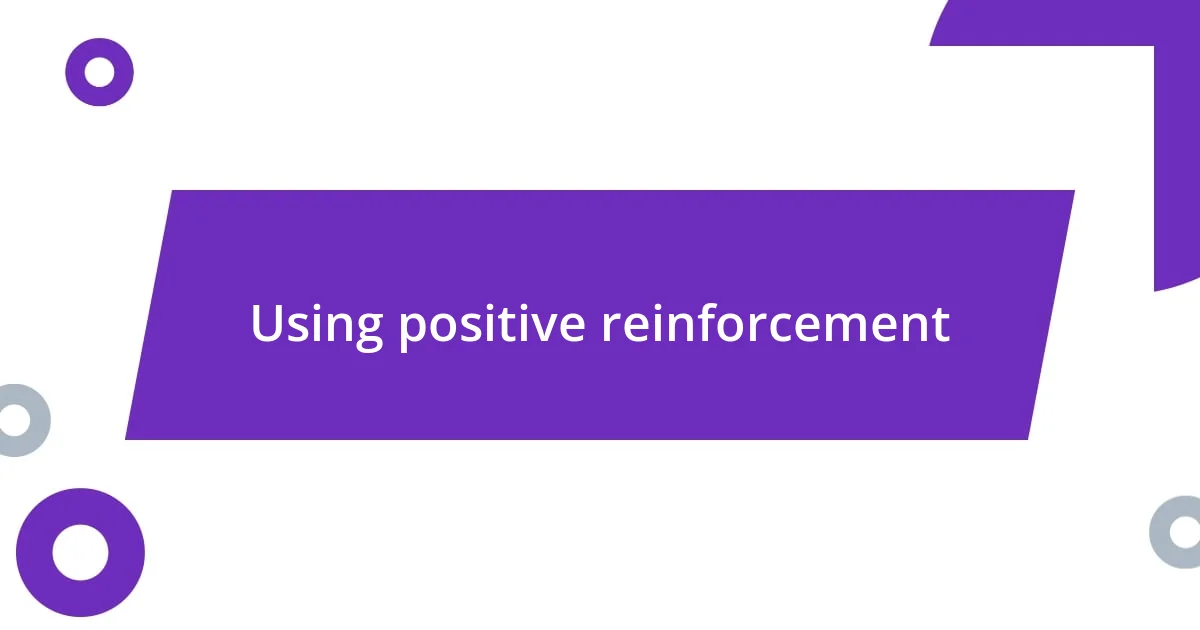
Using positive reinforcement
When I think about positive reinforcement, I can’t help but remember the little rewards I set for myself during my studies. After a long session of intense learning, I’d treat myself to a favorite snack or a quick episode of a show I loved. These small incentives made a world of difference in how motivated I felt. Isn’t it amazing how our brains respond to that little boost of reward? It’s as if the satisfaction of a reward creates an enthusiastic desire to engage with the task again.
I also discovered that sharing my progress with friends played a significant role in keeping me motivated. Each time I completed a milestone, those small celebrations with my friends felt like a mini victory. Their encouragement and recognition offered me a warm sense of achievement, one that pushed me to keep striving. Have you ever noticed how sharing your successes can amplify the joy? For me, it transformed solitary learning into a more enriching social experience.
Lastly, I learned the power of self-affirmation as a form of positive reinforcement. After completing a challenging chapter, I’d take a moment to reflect and affirm what I had achieved—essentially patting myself on the back for the hard work. This practice not only reinforced my dedication but also reminded me of my capabilities. Each affirmation became a personal cheer, fuelling my determination to dive back into my studies. How do you celebrate your own victories? It’s those little moments that can profoundly impact our ongoing journey of learning.
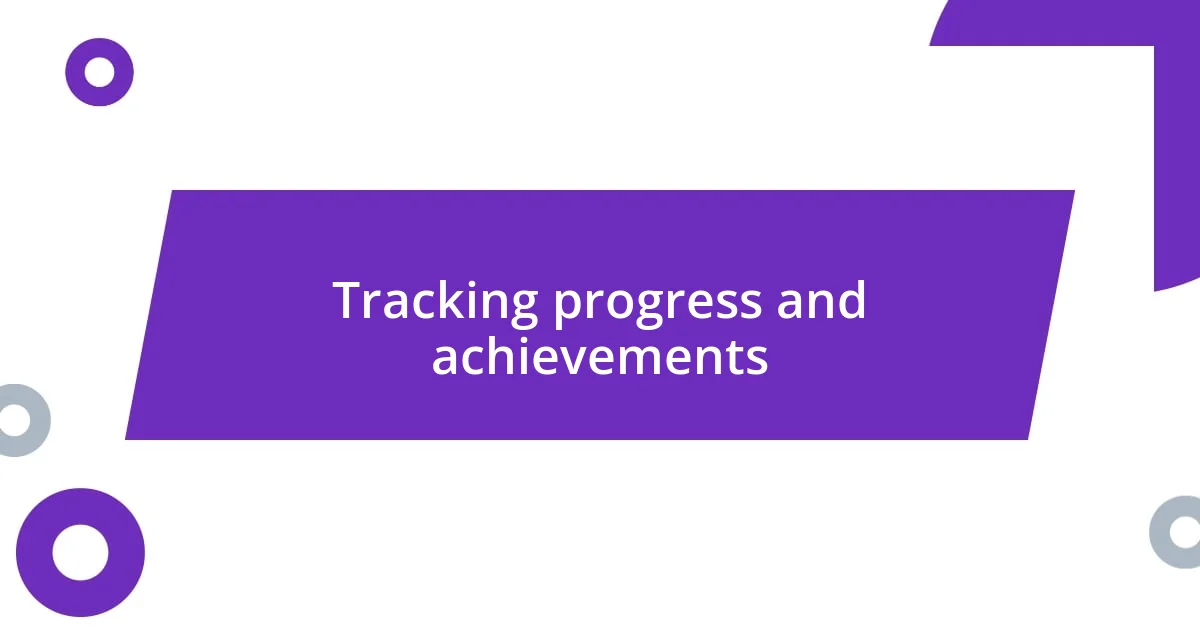
Tracking progress and achievements
Tracking my progress and achievements has truly changed the way I approach learning. I remember the first time I created a chart to monitor my daily study hours and completed topics. Each tick mark felt like a tiny celebration, reminding me that every effort counts and builds towards a larger goal. How satisfying is it to watch those marks accumulate? It’s like witnessing your own growth in real-time.
Using apps to track my progress has added another layer of motivation for me. I opted for a visually appealing planner that included graphs and colorful stickers. When I hit a milestone—whether it was finishing a challenging chapter or completing a week of consistent study—the visual feedback was rewarding. Seeing my progress laid out in front of me often sparked a rush of excitement. Have you ever felt that surge of pride when you can tangibly see what you’ve accomplished?
I also started keeping a “learning journal” to reflect on my achievements. Each entry not only noted what I learned but also my feelings about the process. Sometimes, I’d find myself typing out, “I can’t believe I finally grasped that concept!” That moment of realization felt exhilarating. Reflecting on these moments has solidified my commitment to lifelong learning. Isn’t it incredible how tracking progress can transform our experiences? Each reflection not only shows how far I’ve come but also reinvigorates my passion for what lies ahead.
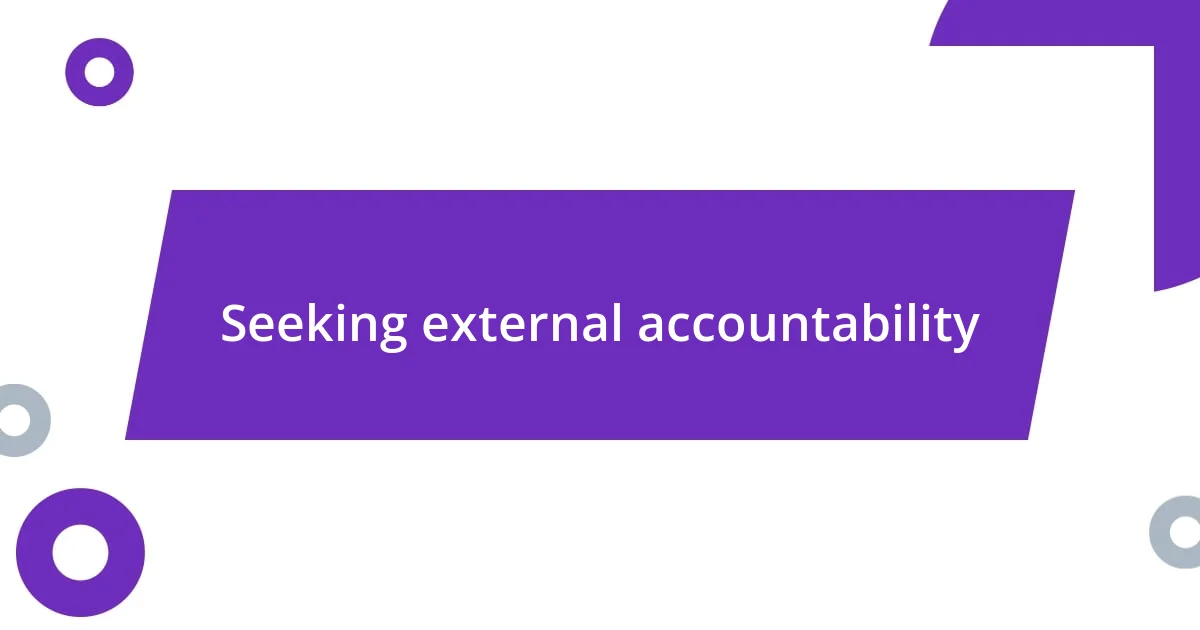
Seeking external accountability
Seeking external accountability has been a game changer for me during my learning journey. I vividly remember the time I joined a study group. Initially, I wasn’t sure about it, but having others around, holding each other accountable, motivated me to stay on track. There’s something about looking into the eyes of fellow learners, especially when you know they’re counting on you, that pushes you to put in the effort—don’t you agree? It became less about individual goals and more about collective growth.
Moreover, I’ve found that sharing my learning goals with a mentor has kept me on my toes. When I set a deadline for a project and shared it during our meetings, the thought of having to report back was quite motivating. Occasionally, I would feel that familiar bullet of dread, wondering if I’d meet my expectations. Yet, each time I faced that mentor, I walked in feeling reinforced by a sense of duty. Have you ever felt that extra nudge when you know someone else is invested in your success?
On another front, social media has also played an interesting role in my quest for accountability. I established a small online study community where we post about our weekly goals and achievements. The comments, support, and occasional check-ins had this thrilling effect on my productivity. It’s like hanging a banner in front of an audience—suddenly, you feel the need to deliver! Have you ever thought about using your social circle, even digitally, to enhance your accountability in learning? It definitely adds a layer of commitment that is hard to overlook.
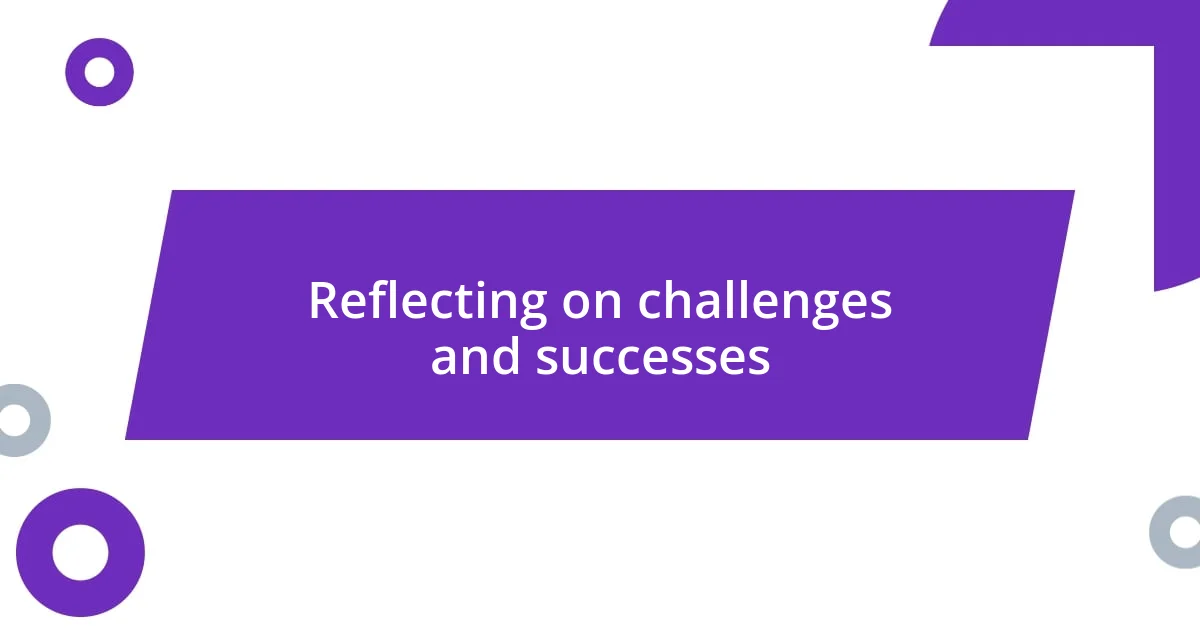
Reflecting on challenges and successes
Reflecting on challenges and successes has been a crucial part of my learning routine. I often find myself thinking back to those moments of frustration when a concept just wouldn’t click. It’s funny how one day you might feel utterly lost, and then a breakthrough happens, often fueled by sheer determination. Has that ever happened to you? I remember one instance where a particularly tough math problem had me stumped for days. When I finally solved it, the feeling of victory was exhilarating. That reflection helped me appreciate not just the end result, but the journey it took to get there.
Sometimes, the challenges I face become my greatest teachers. For instance, I struggled with time management when trying to balance studying with other responsibilities. It wasn’t until I sat down and truly reflected on those stressful periods that I realized it was a learning opportunity. By acknowledging my shortcomings, I was able to adapt my approach and develop effective strategies, like setting smaller, manageable goals. Isn’t it interesting how our most difficult moments can lead us to the most rewarding solutions?
Each success feels incredibly meaningful when I take the time to celebrate it. I recall a moment after finishing a demanding course where I treated myself to a day out with friends. That thoughtfulness in recognizing my hard work not only boosted my confidence but also reinforced my motivation to tackle new challenges. Celebrating wins, no matter how small, keeps my spirits high and encourages me to embrace the next hurdle. Do you also find that honoring your achievements helps sustain your motivation? I genuinely believe that recognizing our progress, both in triumph and struggle, shapes our ongoing learning experience.












